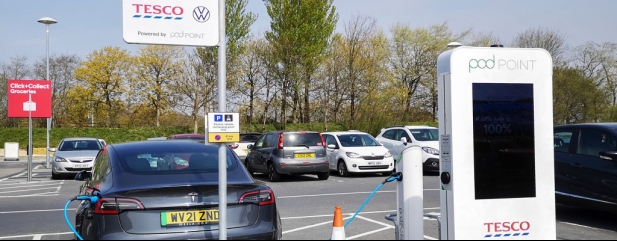Archived article
Please note that tax, investment, pension and ISA rules can change and the information and any views contained in this article may now be inaccurate.
The companies chasing the electric vehicle opportunity

The boss of electric vehicle charging provider Pod Point (PODP), Erik Fairbairn, recently told the Sunday Express he believed the switch to EVs (electric vehicles) would bring about the demise of the petrol station as we know it. It’s an interesting and not so far-fetched view of the future. Think about the way we already live our lives.
When Asda opened the first ever supermarket petrol station back in 1967 many may have raised an eyebrow but by 2019 the Petrol Retailer’s Association estimated that almost half (49%) of all petrol bought in the country was from supermarkets despite them accounting for less than 20% of all forecourts.
FILLING UP AT THE SHOPS
The cheaper prices on offer at the pump from supermarkets will undoubtedly have played a part but so too did lifestyle. Before Covid slowed our pace, time had become the most precious of commodities and any opportunity to multi-task was seized upon.
Pairing the weekly shop with filling up the car made sense and if you could shoehorn in a quick coffee and a stop off at the dry-cleaning booth as well so much the better.
The length of time it takes to charge up an EV will require us to think even more creatively and presents some interesting opportunities for investors to consider. It’s no accident that Pod Point struck a deal with Tesco (TSCO) to increase the number of charge points available in shoppers’ car parks or that other supermarkets have been making similar upgrades to their offer.
EV drivers will be captive consumers and they’ll want to top up wherever they’re doing business. Smart adjustment to retail parks could turn them into EV honeypots.
BROAD APPEAL
Easy access and plentiful parking make them ideal locations and many already mix retail and hospitality to good effect. Going forward we’re likely to see that offer diversify further to include more leisure activities, gyms and soft play rubbing shoulders with personal services like hairdressers and beauticians.
Real estate investor LondonMetric Property (LMP) has already scented the opportunity, signing a deal at the start of 2022 with the UK’s largest independent forecourt operator MFG to house charging hubs at six retail locations.
It’s an offensive move by MFG, which is itself said to be the target of a potential takeover. But if the Pod Point CEO is on the money, if petrol stations are on borrowed time why would the business be on anyone’s radar, least of private equity stalwart Fortress?
Location, location, location is probably the answer and Fortress already has a roster of UK businesses that could fit nicely with the idea of hub venues. When MFG’s current owner Clayton Dubilier & Rice snapped up Morrisons there was plenty of speculation that the two businesses might work very nicely hand in hand.
The competition watchdog would be a potential obstacle to any such deal considering its stance on all the comings and goings at Asda, whose new proprietors also own a large number of UK petrol stations.
THE BIG SWITCH
When you look at the rate at which UK drivers have been making the switch to electric vehicles over the past couple of years you can understand the big interest in the space.
One in six new cars registered in 2021 was electric according to figures from the Society of Motor Manufacturers and Traders, a 586.8% increase between 2019 and 2021.
But the number of charge points increased by just by 69.8%, a significant disconnect which will require rapid action if the big switch to electric vehicles isn’t to stall, particularly as the record cost of fuel might just push more people than ever to ditch their combustion engines for a shiny ’22 plate EV.
Many commentators have described it as a chicken and egg situation. If motorists make the switch the infrastructure will have to follow, but without the infrastructure in place many motorists won’t feel confident that the switch can be made.
The clock is ticking, and eight years won’t be enough time to install enough capacity for every driver to make the change, especially those who don’t have an option to charge up at home.
It will need big changes, big investment and could mean big revenue for businesses like Nexus Infrastructure (NEXS:AIM). From a low base its eSmart Networks arm, which installs EV charging infrastructure, reported a 310% revenue jump for the 12 months to 30 September 2021 to a little more than £9 million with an order book up 255% year on year. Nexus is considering a separate stock market listing for the business.
The UK may not be ready for its next chapter yet but the story is already being written. Will it end with the demise of petrol stations and opportunities for shopping centres and high streets or will it just add to the appeal of supermarkets as fuel points? Time will tell.
Important information:
These articles are provided by Shares magazine which is published by AJ Bell Media, a part of AJ Bell. Shares is not written by AJ Bell.
Shares is provided for your general information and use and is not a personal recommendation to invest. It is not intended to be relied upon by you in making or not making any investment decisions. The investments referred to in these articles will not be suitable for all investors. If in doubt please seek appropriate independent financial advice.
Investors acting on the information in these articles do so at their own risk and AJ Bell Media and its staff do not accept liability for losses suffered by investors as a result of their investment decisions.
 magazine
magazine












